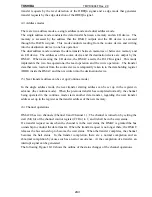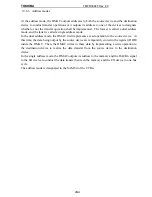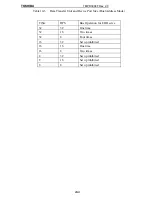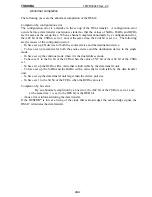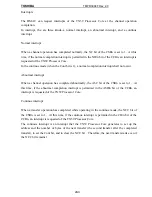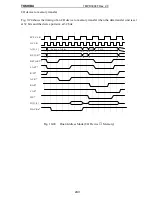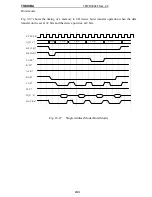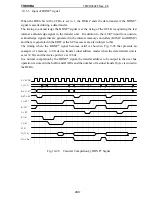
TOSHIBA
TMPR3904F Rev. 2.0
146
26
Single address mode
The single address mode enables the transfer between a memory and an I/O device. The DMAC
outputs the memory address to the memory and outputs the DACKn signal to the I/O device.
The data transfer between the memory and the I/O device is conducted in one bus operation.
In the single address mode, the R/W* signal indicates the bus operation for the memory. The
R/W* signal is high at a memory to I/O device transfer and is low at a I/O device to memory
transfer.
The data transfer unit is designated in the TrSiz field of the CCRn.
If the data transfer size and the device port size are set up in different sizes in the single address
mode, it is operated in the burst mode of (the data transfer size / the device port size)-times. For
example, if the data transfer unit is 32 bits and the device port size is 8 bits, it is a burst
operation of 4 words. The address changes by the data transfer unit. The BCRn value also
changes by the data transfer unit. The set-up where the device port size is larger than the data
transfer unit is inhibited. When the data transfer unit is 32 bits and the device port size is 8 bits,
bus operation becomes a burst transfer.
The following table shows the relationship between the data transfer unit and the device port
size.
Table 10-4 Data Transfer Unit and Device Port Size (Dual Address Mode)
TrSiz
DPS
Bus Operation for I/O Device
32
32
One time
32
16
Set up inhibited
32
8
Four times: Burst
16
32
Set up inhibited
16
16
One time
16
8
Set up inhibited
8
32
Set up inhibited
8
16
Set up inhibited
8
8
One time
In the single address mode, the DMAC does not input and output data so that it does not drive
the data bus.
Summary of Contents for TMPR3904F
Page 1: ...Users Manual 32bit RISC Microprocessor TX39 family TMPR3904F Rev 2 0 Jan 12 1998 ...
Page 2: ......
Page 9: ...Users Manual 01 1 INTRODUCTION 1 1 Overview ...
Page 11: ...Users Manual 03 1 3 Kind of accessing by the TX3904 ...
Page 12: ...Users Manual 04 1 4 Precautions in the TMPR3904F specification Don t set Don t use ...
Page 13: ...Users Manual 05 Do not use ...
Page 14: ...Users Manual 06 ...
Page 15: ...Users Manual 7 2 FEATURES n n n n n n n n n n n n n ...
Page 16: ...Users Manual 8 ...
Page 18: ...Users Manual 10 ...
Page 19: ...Users Manual 11 4 PINS 4 1 Positions of Pins ...
Page 20: ...Users Manual 12 ...
Page 21: ...Users Manual 13 4 2 Functions of Pins ...
Page 22: ...Users Manual 14 ...
Page 23: ...Users Manual 15 ...
Page 24: ...Users Manual 16 ...
Page 26: ...Users Manual 18 5 2 Register Map ...
Page 27: ...Users Manual 19 ...
Page 28: ...Users Manual 20 ...
Page 30: ...Users Manual 22 5 3 2 PIO2 and PIO1 ...
Page 32: ...Users Manual 24 5 3 4 Connection of external bus master 5 3 5 INT 7 0 active status clear ...
Page 33: ...Users Manual 25 5 3 6 INT 7 0 active status set up ...
Page 34: ...Users Manual 26 ...
Page 123: ...TOSHIBA TMPR3904F Rev 2 0 115 26 ...
Page 169: ...TOSHIBA TMPR3904F Rev 2 0 161 26 ...
Page 203: ...TOSHIBA TMPR3904F Rev 2 0 195 ...
Page 230: ......




